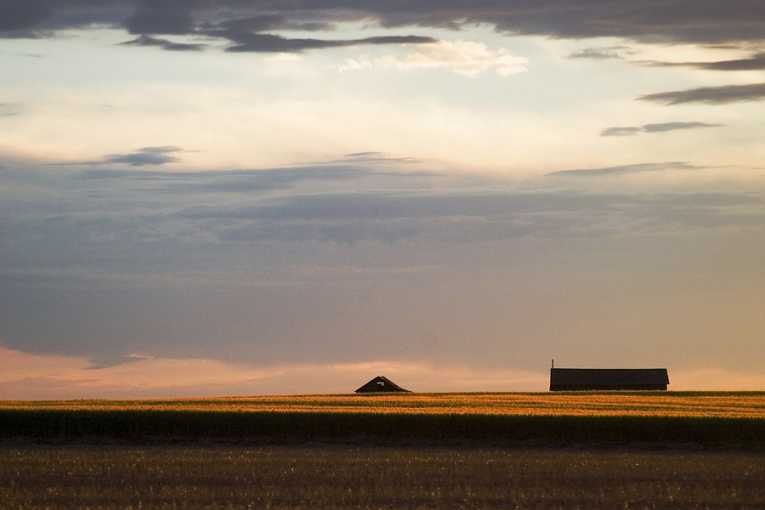An announcement today by Manitoba's largest general farm organisation, Keystone Agricultural Producers (KAP), about the amount of money that farmers see from the food that we buy brings into focus the wider economic issues that affect the production practices they employ and that, consequently, affect the wider ecology in which they make their living and we all live.
The Farmer's Share research project was commissioned by KAP, the Agricultural Producers Association of Saskatchewan, and Wild Rose Agricultural Producers of Alberta.
The Farmer's Share is a snapshot of what consumers pay for products such as vegetables, grains, dairy products and meat as well as what the farmer receives from products when they leave the farm. The study tracked prices for items such as carrots, potatoes, cereal, bread, yogurt, eggs, pork and chicken. With a total grocery bill of $90.10 (Canadian) for the products studied, the 2011 farmer's share for different food groups was as follows: Vegetables 28 per cent, Grain 5 per cent, Dairy 55 per cent and Meat and Meat Alternatives 41 per cent. The overall farmer's share for 2011 was 39 per cent, which was slightly higher than in previous years. This reflected the addition of two new grocery chains to the study.
Project data shows that the farmer's share for vegetables has been declining gradually for three years with the shares for grain and dairy showing slight increases. The farmer's share for meat and meat alternatives has risen steadily over the years reflecting a gradual rise in the farm price while the consumer cost remained fairly stable.
The study only included items that were produced within the three Western Canadian Prairie provinces of Manitoba, Alberta and Saskatchewan.
Manitoba has suffered through a major flood event in 2011, which is being billed as the worst in 300 years. Not surprisingly, the need for a water management strategy for the province is foremost on the minds of many farmers as they head to the provincial polls in October, keenly aware of the fact that it was their arable land and pastures that took the brunt of the flood waters, which were diverted to save large urban centres like the capital, Winnipeg.
But it's far from just a rural, Manitoba issue. Managing scarce and precious resources like water, fossil fuels and even soils is a global issue that confounds governments and people alike, as they seek to balance fragile economies against the encroaching signals that Mother Nature is sending us that she's not entirely happy with what we are doing to her planet.
But coming back to Manitoba, I think the President of KAP, Doug Chorney, said it well in a recent conversation I had with him about election issues and the role that the farmer not only plays in the wider economy but also as an environmental steward. "Right now the economic signals that farmers get are to seed every acre of land they own every year and put down the fertiliser and if it gets flooded out and ends up in the ditch or the creek so be it; they have insurance," says Chorney. "Until we start to send different signals to farmers economically, like a reward for storing water and taking land out of production, you are not going to see these behaviours change."
There has been immense controversy in this little prairie province over the last few years about nutrient management issues, and new regulations have been put in place, which are now being tightened, to try and limit the amount of phosphorus, nitrogen and other nutrients entering Manitoba's waterways. Lake Winnipeg, Manitoba's largest water body, has huge problems with water quality largely because it receives an over abundance of these elements from various agricultural, residential, recreational and commercial sources.
But farmers feel that agriculture is the one industry that is being unfairly targeted by the new regulations. A moratorium on the building of new hog barns and much stricter regulations around manure storage has all but driven the hog industry in Manitoba out of business, and many cattle producers are nervously wondering if they are next.
Many farmers, particularly livestock producers, have voluntarily taken measures to help prevent farm run-off and manure from entering rivers, creeks and lakes. They have fenced off sensitive riparian areas along waterways to keep cattle out, installed remote watering systems (often solar powered) and changed the management of their pastures, using rotational grazing to keep their cattle out at pasture longer and avoid the over-concentration of manure in corrals or farm yards. Which also means that the valuable nutrients in their cattle's waste return to the soil, enriching it and reducing the use of synthetic fertilisers.
And it is precisely these sorts of practices that KAP and the farmers it represents wants to have recognised and rewarded through an Ecological Goods and Service program that takes a carrot approach rather than the stick of regulation and constriction.
Not everything that a farmer does is ecologically sound, and they are the first to admit that, but it's not hard to understand their frustration when every small step they take towards improving their environmental impact - whether it's innovative grazing systems or using variable rate, satellite technology to make sure they are only fertilising the parts of their crops that need it - is largely overlooked and unappreciated.
In a tough industry like agriculture, increasing the Farmer's Share for the goods and services they provide, whether it's though incentive programs or simply insuring they, rather than the ag-corporations, get a larger piece of the overall pie, so that they can earn a decent living and make the investments they need to do it with more sympathy to the planet, would pay dividends for everyone.










